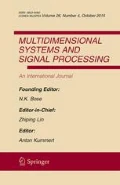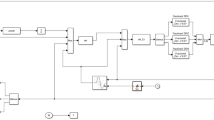Abstract
This paper proposes the PD-type iterative learning control (ILC) for multiple time-delays systems with polytopic parameter uncertainty. Based on repetitive process framework, the system under study is equivalently converted into a class of uncertain repetitive processes with multiple time-delays. This approach accounts for effective inclusion of both time and trial domain objectives and hence some requirements on transient dynamics and trial-to-trial error convergence are incorporated for robust design procedures. Additionally, this approach can easily avoid the need for computation with very large dimensioned matrices as it is required for the lifting approach. Also, the proposed controller is designed with the generalized Kalman-Yakubovich-Popov lemma to ensure the monotonic trial-to-trial error convergence in finite frequency domain. This allows us to reduce the conservatism inherent to entire frequency range approaches since the reference signal spectrum reside in a known frequency range. Moreover, the sufficient conditions for the convergence of the resulting scheme are expressed by linear matrix inequalities and hence they are amenable to effective algorithmic solution. Finally, numerical simulations of different scenarios are presented to illustrate the effectiveness of the proposed method. In particular, to highlight the potential interest in PD-type ILC the robust tracking performance is compared with the results for P and D types of ILC.










Similar content being viewed by others
References
Arimoto, S., Kawamura, S., & Miyazaki, F. (1984). Bettering operation of robots by learning. Journal of Robotic Systems, 1(2), 123–140.
Bristow, D. A., Tharayil, M., & Alleyne, A. (2006). A survey of iterative learning control. IEEE Control Systems Magazine, 26(3), 96–114.
Dai, X. S., Tu, X. M., & Zhao, Y. (2018). Iterative learning control for MIMO parabolic partial difference systems with time delay. Advances in Difference Equations, 32(8), 1434–1438.
Ding, J., & Lin, J. (2014). Modified subspace identification for periodically non-uniformly sampled systems by using the lifting technique. Circuits, systems and signal processing, 33(5), 1439–1449.
Gahinet, P., & Apkarian, P. (1994). A linear matrix inequality approach to \({H}_{\infty }\) control. International Journal of Robust and Nonlinear Control, 4(4), 421–448.
Hladowski, L., Galkowski, K., & Cai, Z. (2010). Experimentally supported 2D systems based iterative learning control law design for error convergence and performance. Control Engineering Practice, 18(4), 339–348.
Iwasaki, T., & Hara, S. (2005). Generalized KYP lemma: Unified frequency domain inequalities with design applications. IEEE Transactions on Automatic Control, 50(1), 41–59.
Jia, Y., Du, J., Meng, D., & Yu, F. (2010). Robust iterative learning control design for uncertain time-delay systems based on a performance index. Control Theory and Applications, IET, 4(5), 759–772.
Jian, J., Hong, Yan, & Xiao, F. (2010). Robust D stabilization of singular systems with polytopic uncertainties. Control Theory and Applications, 8(4), 540–544.
Kurek, J., & Zaremba, M. (1993). Iterative learning control synthesis based on 2-D system theory. IEEE Transactions on Automatic Control, 38(1), 121–125.
Li, J. M. (2011). Adaptive iterative learning control for nonlinearly parameterized systems with time-varying delays. Acta Mathematica Scientia, 31(3), 682–690.
Li, N. N., & Jiang, W. (2017). Convergence analysis of fractional iterative learning control for nonlinear systems with multiple time delays. Pure and Applied Mathematics, 33(1), 69–81.
Li, D., & Li, J. M. (2012). Adaptive iterative learning control for nonlinearly parameterized systems with unknown time-varying delay and unknown control direction. International Journal of Automation and Computing, 9(6), 578–586.
Li, J., Wang, Y. L., & Li, X. M. (2011). Adaptive iterative learning control for nonlinear parametric systems with unknown time-varying delays. Journal of Control Theory and Applications, 16(6), 861–868.
Li, X. J., & Yang, G. H. (2017). Finite frequency \(L_2\)-\({L}_{\infty }\) filtering of T-S fuzzy systems with unknown membership functions. IEEE Transactions on Systems Man and Cybernetics Systems, 47(8), 1884–1897.
Longman, R. (2000). Iterative learning control and repetitive control for engineering practice. International Journal of Control, 73(10), 930–954.
Meng, D., & Moore, K. L. (2017). Robust iterative learning control for nonrepetitive uncertain systems. IEEE Transactions on Automatic Control, 62(2), 907–913.
Oliveira, R. C. L. F., & Peres, P. L. D. (2006). LMI conditions for robust stability analysis based on polynomially parameeter-dependent Lyapunov functions. System and Control Letters, 55(1), 52–61.
Ouyang, P. R. (2012). PD-PD type iterative learning control for time-varying uncertain nonlinear systems. Control and Intelligent Systems, 39(2), 98–107.
Paszke, W., Rogers, E,, & Galkowski, K. (2013). Finite frequency domain design of dynamic controllers for differential linear repetitive processes, American Control Conference, Washington, DC, USA.
Paszke, W., Rogers, E., Galkowski, K., & Cai, Z. L. (2013). Robust finite frequency range iterative learning control design and experimental verification. Control Engineering Practice, 21(10), 1310–1320.
Rogers, E., Gałkowski, K., & Owens, D. H. (2007). Control systems theory and applications for linear repetitive processes, vol. 349 of lecture notes in control and information sciences. Berlin: Springer.
Shen, Y., Zhou, F. Z., & Dong, X. L. (1998). A learning control method based on the principle of pd regulator for robot control with two degree of freedom. Journal of Luoyang Institute of Technology, 19(3), 55–58.
Shi, J., Gao, F. R., & Wu, T. J. (2005). Robust design of integrated feedback and iterative learning control of a batch process based on a 2D Roesser system. Journal of Process Control, 15(8), 907–924.
Soernmo, O., Bernhardsson, B., Kroeling, O., Gunnarsson, P., & Tenghamn, R. (2016). Frequency-domain iterative learning control of a marine vibrator. Control Engineering Practice, 47, 70–80.
Tao, H. F., Paszke, W., Rogers, E., Yang, H. Z., & Galkowski, K. (2017). Iterative learning fault-tolerant control for differential time-delay batch processes in finite frequency domains. Journal of Process Control, 56, 112–128.
Uchiyama, M. (1978). Formation of high-speed motion pattern of a mechanical arm by trial. Transactions of the Society of Instrument and Control Engineers, 14(6), 706–712.
Wang, L., Li, B., & Yu, J. (2018). Design of fuzzy iterative learning fault-tolerant control for batch processes with time-varying delays. Optimal Control Applications and Methods, 39(6), 1887–1903.
Wang, L. M., Mo, S., & Qu, H. (2013). \(H_{\infty }\) design of 2D controller for batch processes with uncertainties and interval time-varying delays. Control Engineering Practice, 21(10), 1321–1333.
Zhang, K., Jiang, B., & Shi, P. (2015). Fault estimation observer design for discrete-time systems in finite-frequency domain. International Journal of Robust and Nonlinear Control, 25(9), 1379–1398.
Zhang, Y. X., & Xu, J. Z. (2012). PD-type iterative learning control law for uncertain time-delay systems. Journal of Beijing Jiaotong University, 36(2), 70–73.
Zhou, Y., & He, L. (2017). Iterative learning control of linear motors with control time delay and loss of measurement data. Control and Decision, 32(8), 1434–1438.
Author information
Authors and Affiliations
Corresponding author
Additional information
Publisher's Note
Springer Nature remains neutral with regard to jurisdictional claims in published maps and institutional affiliations.
This work is supported by National Natural Science Foundation of China (61773181, 61203092), 111 Project (B12018), the Fundamental Research Funds for the Central Universities (JUSRP51733B), National Science Centre in Poland, Grant No. 2017/27/B/ST7/01874, and Serbian Ministry of Education, Science and Technological Development (451-03-68/2020-14/200108).
Rights and permissions
About this article
Cite this article
Tao, H., Li, X., Paszke, W. et al. Robust PD-type iterative learning control for discrete systems with multiple time-delays subjected to polytopic uncertainty and restricted frequency-domain. Multidim Syst Sign Process 32, 671–692 (2021). https://doi.org/10.1007/s11045-020-00754-9
Received:
Revised:
Accepted:
Published:
Issue Date:
DOI: https://doi.org/10.1007/s11045-020-00754-9



